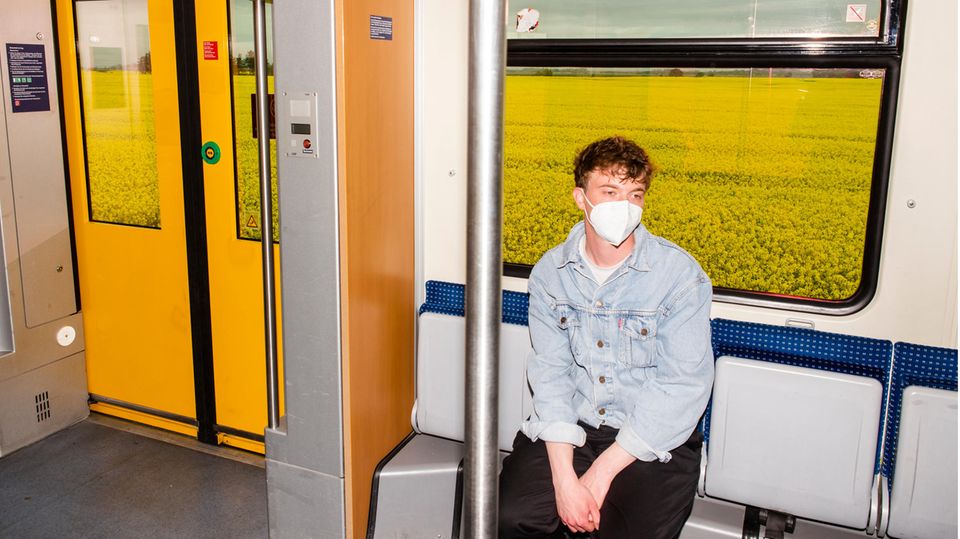Local transport flat rate
The Germany ticket will remain in 2024 – but at what price is questionable
The Germany ticket for buses and trains could soon cost commuters significantly more (symbolic image)
© Lukas Schulze/DPA
Actually, everyone thinks that the Deutschlandticket for buses and trains throughout Germany is a success. But then there was a long problem with money again. Now a way out is in sight – will it soon be more expensive?
After a lot of fuss and warnings of an impending end, millions of passengers are now free of at least one doubt: the Deutschlandticket for local buses and trains across the country is still available. Chancellor Olaf Scholz (SPD) and the Prime Ministers agreed on steps towards further financing on Tuesday night. But there are still points open. And a big question is how long the ticket will continue to be offered at an attractive 49 euros per month or will it soon become more expensive. That’s why the next struggle begins now. It’s not just consumer advocates who are calling for more reliability in the offering.
Federal Transport Minister Volker Wissing welcomed the decision taken by the federal and state governments. The decision shows that the debate started by the states about financing the ticket was completely unnecessary. “Apart from unsettling consumers, they have achieved nothing,” said the FDP politician. He called on his country colleagues to “work objectively on the success of the Germany ticket and to stop questioning it unnecessarily.”
The atmosphere had already calmed down before the round with Scholz. The chairman of the Prime Minister’s Conference, Boris Rhein (CDU) from Hesse, called the ticket a successful model. “We want to keep it going.” The federal and state governments agreed on a procedure for the connection, but it still raises tough questions.
The chairman of the state transport ministers, Oliver Krischer (Greens) from North Rhine-Westphalia, said that they would comply with the order and develop a concept for a long-term secured ticket. However, the financial framework that has now been set restricts many things and could mean that the introductory price will no longer be maintainable from May 2024. At least in the first year after the introduction, i.e. until the end of April 2024, there will be no price increase, Lower Saxony department head Olaf Lies (SPD) emphasized on Tuesday.
Operation Redeployment
The plan envisages being able to use unused funds for 2023 in 2024 to compensate for financial disadvantages caused by the cheap ticket. According to an agreement at the end of 2022, the federal and state governments are already contributing 1.5 billion euros this year and next year to compensate for loss of income among bus and train operators. But the sticking point recently was any additional costs beyond that. It has only been agreed that the federal and state governments will share them equally for the introductory year of 2023. The transport industry and states have long been calling for this to happen by 2024. There is no longer any talk of that. With the future concept, further “obligation to make additional contributions” for the federal and state governments should be off the table.
Accurate interim billing
It is not yet possible to quantify what additional costs there will be. The federal and state governments are therefore planning a precise “peak calculation” for 2023 and 2024, which the states should carry out once final data is available. According to a forecast by the Association of German Transport Companies (VDV), losses for the industry this year are likely to be 2.3 billion euros, after the ticket only started at the beginning of May. In the full year 2024 it is likely to be 4.1 billion euros. With six billion euros in subsidies for 2023 and 2024, the bottom line could be a gap of 400 million euros. The debate about the future of the ticket is “going into extension,” commented the VDV.
The ball for the financial concept
Lower Saxony’s Prime Minister Stephan Weil (SPD) explained that the transfer of funds creates the basis for the ticket to continue in 2024. There should be a change in the law for this. “The transport ministers have to tell us whether and in what form this will have an impact on pricing.” In this respect, the ball is handed back to the ministers. The “bosses” therefore commissioned the Conference of Transport Ministers to present a concept – in good time before May 1, 2024. Then the ticket will be one year old. The order includes a mechanism for updating the ticket price, “which can also include an increase”.
The tricky question of price
It was always clear in principle that the price of 49 euros could rise at some point. Because it is considered an “introductory price” right from the start. But now a possible increase for 2024 is actually on the table. The environmental organization Greenpeace warned: “If customers expect a price increase at any time, then that will strangulate the success of the ticket before it has even arrived.” The consumer advice centers warned that this made the ticket neither more attractive nor more reliable. The price of 49 euros is already the pain threshold for many. The ADAC motorists’ club demanded that the future price should not deviate significantly from the current one. Affordability is a good and important argument for local public transport.
Germany ticket
Spectacular railways – you can experience these dream routes for 49 euros a month
Deutschlandticket: Next stops
In the traffic light coalition, the Greens immediately campaigned for a stable price. Inflation makes life expensive for many, and the ticket is attractive because of its low price. “That’s why it’s important that the Germany ticket remains a 49-euro ticket,” said parliamentary group leader Katharina Dröge. SPD parliamentary group deputy Detlef Müller said that the federal and state transport ministers must now quickly create reliable mechanisms for planning for transport providers and subscriptions. In the decision, the federal and state governments emphasized that the ticket should be further developed, simplified and made more digital. The aim is also “to reduce possible financing deficits as much as possible with a successful transition offensive”.


